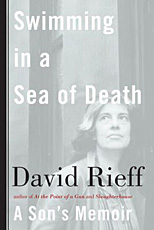"If only my mother hadn't hoped so much. But to say this is to posit the impossible. Throughout her life, my mother had been incapable of doing anything else but hope, hope in extremis, and against all odds if need be. I do not mean to imply that she was a cheerful person. Quite the contrary, she was almost always dueling with depression. This was clearest immediately after she woke up, when, in an effort to shake off her despondency, she would talk, about anything and at breakneck speed, as if to overwhelm her mood with meteor showers of verbiage. And yet, paradoxical as it may seem, even the ways in which she parsed her own despair could themselves appear like a subspecies of hope. I only realized this fully when I saw on the first page of one of her journals, written in the immediate aftermath of her breast cancer surgery, the sentence 'Despair shall set you free.' At first, I assumed she was making a morbid joke, but, reading on, I discovered that she had been entirely in earnest. 'I can't write,' she noted, 'because I don't (won't) give myself permission to voice the despair I feel. Always the will. My refusal of despair is blocking my energies.'
"Described in this way, my mother's exhortation to herself to 'give in' to despair becomes a new project of self-transformation, even of self-improvement, almost in the same way that her self-assigned reading lists and itineraries were such projects. But how could it have been otherwise? My mother's refusal of despair in its conventional, paralyzing sense, and, more than that, her sense that whatever she could will in her life she could probably accomplish as well (except in love: there she thought herself bereft of any gift and did not believe the will of any use at all), had served her so well for so long that, empirically, it would have been madness on her part not to have made it her organizing principle, her true north.
"When she was young, the strength of my mother's hope and that steeliness of her will that became the source both of such pride and such rue to her — for her, the two almost always went hand in hand — had seemed the only way to survive. 'I lived on a high horse,' she writes in one journal entry, 'without saddle sores.' And she told me more than once that she believed that hope and will had been all she had to see herself through her alienated childhood, get herself out of the Southwest and on to the University of Chicago, where, at seventeen, she agreed to marry my father after knowing him for a little more than a week. Seven years later, that same sense of being able to remake no matter the obstacles and not just remake it also to make version two, or three, or four better than their predecessors — had given her the strength to extricate herself from the marriage."
